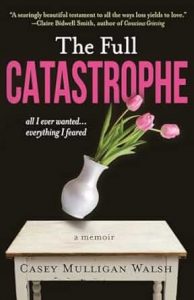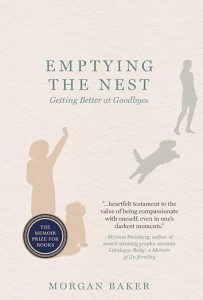Interview with Casey Mulligan Walsh, author of The Full Catastrophe: All I Ever Wanted, Everything I Feared
Interview by Morgan Baker
If you read “The Full Catastrophe: All I Ever Wanted, Everything I Feared,” and you should, it may seem like the memoir is about Casey Mulligan Walsh’s son Eric’s untimely death in a single-person car accident when he was 20 and Casey’s grief. While that is most definitely part of it, you’ll see the memoir is really about Casey’s search for belonging, for home, which is very relatable.
Eric’s wasn’t the first loss Casey endured. Both her parents died when she was young and in her early adult life, her brother also died. While she lived with an aunt as she grew up, that family never felt like her own. Her biggest wish was to have her own family. And she did, marrying her high school sweetheart, living across the street from her in-laws and having three children. But we don’t always get what we wish for. Her marriage imploded, she began to think about what would help her grow as a person (going back to school),and when her son died, she was way past anger. She had worked through much of that during the divorce leading up to Eric’s death. When he died she was sad but had a sense of peace. She was on her way to finding home, but You’ll have to read the book to find out what happens.
In addition to Casey’s memoir, she is also one of five editors for a new website: https://inaflashlitmag.substack.com. They are looking for essays 500 words or less. Each editor is assigned a month for which they are responsible for the theme and decisions.
When the reader starts the book, we know immediately how it’s going to end – with Eric’s death. Even though I knew what was coming, it was still traumatic and sad. Why did you start it that way?
Eric’s death happens three quarters of the way through the book. The end of the book is a whole different story. But we tend to think of Eric’s death as the end, because that’s what we’re driving toward since the beginning. This was a big struggle during the writing…Is this a book about Eric, or is this a book about me? This book isn’t only about grief. It’s a book about relentless resilience in the face of repeated loss, but it’s also, and maybe more so, a book about the search for belonging and search for home. That was the struggle. When an editor said I needed to figure out which it was, I knew it was about me. I had one editor who said to revamp the book and make it into a story of mother and son. But you know your story. When you work with other writers, you’re developing writing skills and you’re also learning how to listen to critique and take what makes sense.
When the reader finishes the book, you know where you find home (spoiler: not telling you).
As a writer, once you finally figure out what the kernel is, what the thread is, then you can go back and recalibrate every scene.
For many years, I wondered how it would be to wake up in the world knowing you belonged there. I had never felt that way. There was an intangible longing for this thing I didn’t really have. So, once I realized the book was about the search for belonging, that really guided the rest of it.
The whole book is in present tense. That’s a risky tense to work in for a whole book. Can you share why you chose to do that? And, by the way, it works.
You can do it. You just have to be careful to do it well. I worked hard to avoid one of the pitfalls of present tense, which is being in the middle of some horrible situation and jumping into the “well one day, I’ll understand.”. I wanted readers to stay with me in the story as it actually happened.
There is a lot of anger in the book, mostly on the narrator’s part, especially during the last few years of her first marriage. How did you portray all the anger and not lose your reader? How did you manage to put that mirror up and look at yourself?
Those are big daunting tasks for any writer, and they were big, daunting tasks for me. I was the mother who tried really hard. I didn’t run away, leave my kids. I just stayed and tried to be a good mother. I was trying to do the right thing so that makes it harder, I think, to dig deeper.
The two things that were the hardest were making myself into that flawed narrator and not sugar-coating things. The other was having that balance of light and dark, to write about happy times, because there were a lot of difficult times.
I had so much fear. I had no family, and my boys were almost young men. When their father did something that was threatening our place to live, I definitely ranted to them when I shouldn’t have. I finally realized I’d married someone who was wrong for me, and then I tried to make him into someone he just could not be.
One of the biggest challenges I faced was writing about something that was relentless to live without it being relentless to read.
Oh, that’s a really good point.
The easy part to write was how my marriage was always difficult, but I had to really dig deep to bring my mind and heart back to the times that we were really happy.
I’m curious how you came up with the title. I love it. At the end of the book, you mention Zorba the Greek and that there is a line in that movie. I think coming up with a title is so hard.
The struggle for me was the subtitle. Jon Kabat-Zinn wrote a book called Full Catastrophe Living. He takes the term from Zorba, but interprets it as “the poignant enormity of life.” Bring on the dirty diapers and the bills and the fun, the joys and the sorrows. The subtitle-All I Ever Wanted, Everything I Feared—captured the double meaning of the full catastrophe for me.
How long did it take to write the book?
I began to write in 2011, twelve years after my son’s death, when I wrote short pieces for a class with Marion Roach Smith. In 2017 I was accepted into a New York State Writers Institute workshop and started to put the heart of each essay into chapters that would form a book.
I knew fairly early on it really need to be a story with a narrative arc. It took 12 years to arrive at my final draft.
Robert Frost has been quoted as saying, “No tears for the writer, no tears for the reader.” Can you tell me if writing this brought up tears? I know I got weepy.
I didn’t really cry while writing, perhaps because I started writing 12 years after the divorce and Eric’s death. I had some distance writing the trauma. Though I didn’t cry when I was writing it, I sometimes get teary when I’m trying to read it aloud.
Some of my weepiness was when Eric died, but some was at the end when the narrator finds home.
For me, the end of the book is the teary part. The end of the book is where I was able to unpack the lessons I’d learned and where so much resolution happens for me, where I was able to find forgiveness for so many of the people who had caused me pain.
Any new writing on the horizon?
I have a lot of essays in the hopper. I’ve always thought if I wrote another book, it would be a collection of essays about living with grief and joy. I have a dark, humorous working title, but I think that first I have to see where this book takes me.
—
 “The author is unflinchingly honest and vulnerable, examning her deep well of taruma-induced loneliness and her desperate love for her children…Walsh’s prose is accessible and heartfelt. A stirring and relatable portrait of a struggling family.” -Kirkus Reviews (Recommended Review)
“The author is unflinchingly honest and vulnerable, examning her deep well of taruma-induced loneliness and her desperate love for her children…Walsh’s prose is accessible and heartfelt. A stirring and relatable portrait of a struggling family.” -Kirkus Reviews (Recommended Review)
“This is a story about true resilience. A searingly beautiful testament to all the ways loss yields to love.” –Claire Bidwell Smith, author of Conscious Grieving
Casey needs a family of her own: the joys and the sorrows, people who love her, and a place she belongs-what Zorba the Greek called “the full catastrophe”-and she’s determined to make it happen.
Adrift in the world after losing her father to a heart attack when she was eleven and her mother to cancer soon after, the death of her only sibling eight years later strengthens her resolve.
Casey marries, has three children, and though she struggles with grief and a shaky sense of her place in the world, she thinks she’s found the life she’s longed for. But soon it’s clear her marriage isn’t the dream she envisioned. When her husband’s behavior shifts from troubling to destructive, a contentious divorce and custody trial propel her family into a catastrophe she never imagined.
Searching for meaning, Casey embraces the spirituality she’s sought in various forms since her youngest years. Then the unthinkable happens-her twenty-year-old son Eric dies-and she’s left to make sense of her family’s collapse and the sudden yet somehow inevitable loss of her beloved boy.
A profoundly moving tribute to the power of love, The Full Catastrophe is the story of a life of loss and sorrow transformed into one of hope and redemption. With hard-won wisdom, Casey shows us how peace and belonging can only be found within ourselves.
BUY HERE
Interview by Morgana Baker
MORGAN BAKER is an award-winning writer and professor at Emerson College. Her memoir Emptying the Nest: Getting Better at Goodbyes (Ten16 Press) is about reinventing yourself, learning how to handle loss, and emerging from depression and was honored with the Memoir Magazine’s award for Family/Relationship category as well as one of the 100 notable memoirs from Shelf Media. Other work is featured in The New York Times Magazine, The Boston Globe Magazine, Motherwell, The Brevity Blog, The Boston Parents’ Paper, Dorothy Parker’s Ashes, Talking Writing, The Bark, Cognoscenti, among many regional and national publications. She is the managing editor of The Bucket. She is the mother of two adult daughters, and lives with her husband and two dogs in Cambridge, where she quilts and bakes.
Emptying the Nest: Getting Better at Goodbyes
 2024 Independent Press Award Distinguished Favorite
2024 Independent Press Award Distinguished Favorite
Emptying the Nest: Getting Better at Goodbyes, is about change, identity, and mental health. When Morgan Baker’s daughter, Maggie, left for college and Baker also parted with nine puppies from a litter the family raised, she collapsed into a deep depression. She eventually adjusted and, with a lot of help, did better when her younger daughter left for school. By the time Maggie graduated from college and moved to LA with her boyfriend, Baker was ready. She prepared by focusing on herself, and what she wanted. Her identity shifted. While Baker will always be a nurturer, she is more than a mother.
BUY HERE
Category: Interviews, On Writing






























